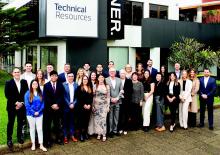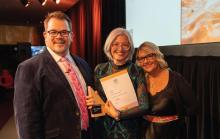How CEOs tackle the big issues and inspire their teams.


Many CEOs or directors of Not For Profits have arrived at their current board room via a circuitous route. Contrary to perhaps popular belief, they are not necessarily driven by a higher vision to ‘do good’. Of course, this is part of the story for many, but the driving force of successful and inspirational NFP leaders is to make their organisations fiscally strong, relay the vision for future growth and ‘walk the talk’.
In a short series of articles, we share some of the motivations of WA’s NFP CEOs, and an insight into what drives these leaders of one of the most challenging business sectors.
Same but different

Michael Chester and Jen Park Co-CEOs Uniting WA
What makes the CEO of an NFP different, according to Uniting WA co CEO Michael Chester, is that they must deliver meaningful services which make an impact in their communities, while running their organisation within a regulatory and business environment that is much the same as for their profit-driven corporate counterparts.
“NFPs don’t have the option of raising prices to cover increased regulatory costs – so we need to continuously improve systems and processes to get a better return from fixed resources,” Mr Chester said.
“And we do so while delivering our services under the demands of ever-increasing layers of complexity relating to service quality, service measurement and constrained funding envelopes,” he said.
Mr Chester said leading an NFP required commitment to ensure the organisation remained fiscally viable.
“Uniting WA’s financial performance is a significant measure of success. Our surpluses are reinvested into the organisation across key areas such as workforce, technology and service development.”
Another challenge is measuring NFP output – it is not the usual product defined by market demand or share price, Mr Chester said.
“The measures to assess service delivery are more difficult to quantify,” Mr Chester said.
“At Uniting WA, we have Program Logics in place for every service we deliver. We evaluate everything we do to make sure it aligns with the WA State Outcomes Framework as well as Uniting WA’s vision for change.”
Another piece of the jigsaw is training and retaining a dedicated workforce, Mr Chester said.
NFPs must be nimble and think outside the box – which is what Uniting WA demonstrated this year with its bold decision to appoint two Co-CEOs to the top job, Mr Chester said.
Michael Chester’s offsider is Jen Park and both take great pains to make the partnership work for organisation.
“It takes a lot of ingenuity to run an NFP and the way Jen and I see it, two heads filled with ideas, two hearts set with determination and two pairs of hands to divvy up the work is a better outcome for Uniting WA. We were glad the Board agreed,” Mr Chester said.

Uniting WA team members at work
Identifying the turning point – and making the switch from corporate to NFP
Michael Chester’s career has spanned the resources, transport, logistics, health and disability sectors. The turning point for him to switch to the NFP sector was when he realised “the misalignment between what I was doing and my own sense of purpose.”
“I understand the imperative of the commercial aspect of business, but I was conflicted when that impinged on an organisation’s ability to treat its people right.”
“I have a very strong internal sense of right and wrong, fair and unfair,” he said.
“This explains why I ended up with a large portfolio of clients in the disability and NFP sector when I was a management consultant. It was my way of keeping connected to my purpose.”
How to attract an effective NFP CEO
If you can identify a leader with solid operational skills and a personal mission which aligns with the NFP’s long-term vision, chances are the professional relationship will be a successful one, Mr Chester believes.
Mr Chester has over 3 decades of general and executive management overseas and in Australia.
He believes in building organisations that are efficient service providers, effective advocates for their clients, trusted community partners and employers of choice.
The personal motivator for Mr Chester is knowing that Uniting WA is making a difference in the lives of people every day.
“Knowing that the work we undertake at Uniting WA is delivering on our purpose to inspire people, enliven communities and confront injustice plays out for me as a strong sense of responsibility to make our world more equitable.”











